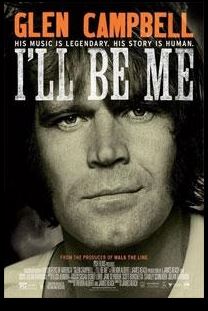October 27th, 2014 by Dr. Val Jones in Announcements, Medical Art
Tags: Alzheimer's, Alzheimer's Association, Aricept, Behavioral Problems, Cognitive Impairment, Country Music, Dementia, Documentary, End Stage Alzheimer's, Glen Campbell, I'll Be Me, Mayo Clinic, Movie, Movie Review, Neurology, Outbursts
No Comments »
 Country music legend Glen Campbell is dying of Alzheimer’s disease. In an effort to raise awareness of the illness he and his family made the brave decision to bare their lives by creating a documentary of Glen’s farewell tour. I highly recommend that you watch this film with your loved ones… and a box of Kleenex.
Country music legend Glen Campbell is dying of Alzheimer’s disease. In an effort to raise awareness of the illness he and his family made the brave decision to bare their lives by creating a documentary of Glen’s farewell tour. I highly recommend that you watch this film with your loved ones… and a box of Kleenex.
One of the most remarkable aspects of Glen’s disease was the preservation of his musical abilities despite severe cognitive impairment. Although he rarely knew where he was or even how to tie his shoes, he was able to perform songs in front of live audiences. With redirection and prompting, he managed to participate in 151 concerts across the United States within the span of ~18 months. Accompanied by his gifted guitarist son and daughter, and his doting fourth wife Kim, Campbell was able to maintain his musical self for longer than his physicians ever anticipated.
The documentary held nothing back – from violent outbursts brought on by paranoid delusions of golf club theft, to inappropriate table manners, to hypersexuality triggered by too high a dose of Aricept – the trials and tribulations of being a caregiver for someone with dementia were painfully acute. In brief moments of insight, Glen himself would manage to stammer a “Thank you. For being so nice to me. I have been an ass.”
One of the saddest moments of the movie was a brief clip of his daughter testifying before congress. She explains that memories are what lives are made of – and that although she is holding fast to the memories made with her dad, she knows that soon he will not even know who she is, and that their time together will be meaningless to him. Campbell listens silently next to her with a pained expression and misty eyes.
The movie’s final song, artfully strung together from clips of Glen singing repeat phrases into a studio mic, is haunting:
“I’m Not Going To Miss You”
I’m still here, but yet I’m gone
I don’t play guitar or sing my songs
They never defined who I am
The man that loves you ’til the end
You’re the last person I will love
You’re the last face I will recall
And best of all, I’m not gonna miss you.
Not gonna miss you.
I’m never gonna hold you like I did
Or say I love you to the kids
You’re never gonna see it in my eyes
It’s not gonna hurt me when you cry
I’m never gonna know what you go through
All the things I say or do
All the hurt and all the pain
One thing selfishly remains
I’m not gonna miss you
I’m not gonna miss you
Alzheimer’s is a terrible, cruel disease. I share the frustration of the Mayo Clinic neurologists who treated Glen Campbell – unable to do much more than simply document his decline and mentally prepare his family for the next stages of the disease. To all those who are taking care of people with Alzheimer’s I offer my sincere admiration and respect. To those who face a genetically higher-than-average chance of contracting the illness (such as myself), I tremble and hope for a cure.
June 23rd, 2014 by Dr. Val Jones in Announcements, Quackery Exposed
Tags: Dangers, Dietary Supplements, Dr. Oz, Green Coffee Beans, Lies, Misinformation, Orrin Hatch, Tom Harkin, Vitamins
1 Comment »
Comedian John Oliver did an excellent job explaining everything that’s wrong with the Dr. Oz show and the dietary supplement industry. Please watch this video for a good laugh:
I’ve been warning folks about Dr. Oz for many years – and I hope that John reaches more people with his message.
To be fair, there are reputable companies who manufacture safe and effective vitamins and supplements too, as I have noted here.
April 30th, 2014 by Dr. Val Jones in Announcements
Tags: American Resident Project, healthcare, Improvement, Medicine, New Ideas, Scholarships For Medical Students And Residents, Social Media, Think Wellpoint, Writing, Writing Fellowships
No Comments »
 In case you hadn’t seen this announcement in my Twitter stream – there are a number of writing fellowships available for US medical students and residents. (Bloggers and those heavily engaged in social media are preferred.) Join The American Resident Project Writing Fellows in brainstorming about how to make the healthcare system better for future generations. Fellowships are awarded on a rolling basis. Opportunities for travel are included. From their website:
In case you hadn’t seen this announcement in my Twitter stream – there are a number of writing fellowships available for US medical students and residents. (Bloggers and those heavily engaged in social media are preferred.) Join The American Resident Project Writing Fellows in brainstorming about how to make the healthcare system better for future generations. Fellowships are awarded on a rolling basis. Opportunities for travel are included. From their website:
The American Resident Project is a platform for future physician leaders – medical students, residents and physicians newly in practice – to connect, explore ideas for transforming American health care delivery, and exchange these views with other health care providers and opinion leaders across the country.
Sponsored by ThinkWellPoint, The American Resident Project focuses on key issues affecting today’s frontline physician workforce, including:
New care coordination models
Strategies for patient engagement
Innovations in health technology
Join our growing community, lend your voice and share your ideas on these and other important topics shaping the future of health care delivery in America.
I will be playing a mentorship role in the program going forward, and look forward to meeting some of my young Writing Fellows in the near future!
Apply for the fellowship here.
March 18th, 2014 by Dr. Val Jones in Announcements, Health Tips
Tags: #DoctorFinder, Best Doctors, Doctor Finder, Doximity, eDocAmerica, Healthgrades.com, How To Find A Good Doctor, Twitter, Twitter Chat, Twitterview, US News And World Report, Vitals.com
No Comments »
 I’m excited to announce that US News and World Report has invited me and some other social-media savvy physicians to participate in a live Twitter chat about how to find a good doctor. The chat will be held on Thursday, March 20th at 2pm EST. You can join the conversation by following the #DoctorFinder hashtag or take the pre-chat poll here.
I’m excited to announce that US News and World Report has invited me and some other social-media savvy physicians to participate in a live Twitter chat about how to find a good doctor. The chat will be held on Thursday, March 20th at 2pm EST. You can join the conversation by following the #DoctorFinder hashtag or take the pre-chat poll here.
Most people, including physicians, rely on personal references to find a good doctor. But what do you do when you’re far from home, or you don’t know anyone with firsthand knowledge of local doctors? My parents recently asked me to recommend a physician for them in a state where I knew none of my colleagues personally. This is the 10-step process that I used to help them navigate their way to an excellent specialist – I hope it helps others you find the right doctor as well!
1. Determine what kind of doctor you need. You’d be surprised how many different specialists treat the same symptom – depending on its underlying cause. Take “back pain” for example – should you see a primary care physician, an orthopedist, a neurosurgeon, an anesthesiologist, a rheumatologist, or a rehab specialist to evaluate your symptoms? That depends on the cause of the pain, which might not yet be evident to you. The first step to finding a good physician is to figure out which type is best suited to your potential diagnosis. Bouncing from specialist to specialist can be costly, so if you’re not sure which kind of physician specializes in treating your disease or condition (or if you haven’t been diagnosed yet), start with a primary care physician first.
If you’d like to ask an online physician about your symptoms (or find out which specialist would be the most appropriate for you or your loved one), eDocAmerica.com is my favorite online physician consultant service (note that I answer questions for them.)
2. Compile a list of all the doctors (of the specialty you need) in your area. This list can be generated by your insurance carrier or by an online search of doctor-finder databases such as Healthgrades.com, Vitals.com, or US News & World Report’s Doctor Finder directory.
3. Narrow online choices by your preferences (available via Healthgrades.com or Vitals.com databases.) Check out the doctors’:
Hospital affiliation(s)
Office location(s)
Educational background
Specialty interests
Languages spoken
Years in practice
Gender
Types of insurance accepted
Review CV if available (often on affiliated hospital website)
Check out patient reviews (take them with a grain of salt in case they are skewed by an unfairly disgruntled patient)
Make sure they’re accepting new patients
4. Do an online “background check” of your top choices.
5. Make an appointment – consider the following qualities in a good physician experience:
- The team: courteousness of scheduling staff, professionalism of nurses, PA’s, techs, etc.
- Facilities – cleanliness, comfort
- Medical records/communication – how will they provide you your data? EMR? Email?
- Timeliness/convenience
6. Come prepared
- Bring your list of medications
- Bring a list of your medical and surgical history/conditions
- Bring a list of your allergies
- Bring contact information for your other physicians/providers
- Bring your insurance information
7. Ask the right questions
- How many procedures (like the one I’ll need) have you performed previously?
- What are the risks/benefits of the procedure? Alternatives?
- What should I read to learn more about this?
- If unsure of diagnosis: What else could this be?
- Are there other medicines that are less expensive that we could substitute?
8. Go with your gut
- Did the doctor explain everything clearly?
- Did the doctor seem to care about you?
- Do you trust your doctor to be thorough with follow up?
- Do you like your doctor?
9. Get a second opinion
- If the doctor did not meet your expectations in any significant way, find another one
- If you want to be sure that you’re on the best path, get a second opinion from one of his/her peers or do it online: eDocAmerica (for generalist questions), Best Doctors (to be matched with top national specialists)
10. Reward good doctors with good online recommendations so others can benefit. Physician ratings are only as reliable as the reviewers. Help other patients locate good doctors by promoting those who deserve it.
October 10th, 2013 by Dr. Val Jones in Announcements, Health Policy
Tags: American Resident Project, Fresh Ideas, Healthcare reform, Innovation, Medical Students, Residents, Wellpoint, Young Doctors
2 Comments »
 I have been an outspoken, and often times exasperated, patient advocate and student of healthcare reform. There is no doubt that the U.S. healthcare system is operating far below its potential in terms of efficiency, effectiveness, and affordability. In fact, an entire industry of policy wonks and consultants have sprung up in both the public and private sectors – all with recommendations about how to “fix” our system. In my opinion, the most insightful suggestions will come from those who are currently doing the work of healthcare (i.e. clinicians) and change will be adopted and promoted most fervently by the young and freshly minted among them.
I have been an outspoken, and often times exasperated, patient advocate and student of healthcare reform. There is no doubt that the U.S. healthcare system is operating far below its potential in terms of efficiency, effectiveness, and affordability. In fact, an entire industry of policy wonks and consultants have sprung up in both the public and private sectors – all with recommendations about how to “fix” our system. In my opinion, the most insightful suggestions will come from those who are currently doing the work of healthcare (i.e. clinicians) and change will be adopted and promoted most fervently by the young and freshly minted among them.
Medical students, residents, and physicians newly in practice now have a place to voice their opinions – The American Resident Project is an ambitious movement to promote fresh thinking from tomorrow’s physician-leaders. I am pleased to be supporting this effort here on my blog and in face-to-face meetings with fellows at medical centers across the country. I hope you’ll bookmark the website and join in the community conversation about how to innovate in the midst of a broken system. This is more than a think-tank for change – the ideas and opinions of young doctors may be our best hope for a brighter tomorrow.
Stay tuned for some fresh ideas in the setting of some healthy talk therapy!
 Country music legend Glen Campbell is dying of Alzheimer’s disease. In an effort to raise awareness of the illness he and his family made the brave decision to bare their lives by creating a documentary of Glen’s farewell tour. I highly recommend that you watch this film with your loved ones… and a box of Kleenex.
Country music legend Glen Campbell is dying of Alzheimer’s disease. In an effort to raise awareness of the illness he and his family made the brave decision to bare their lives by creating a documentary of Glen’s farewell tour. I highly recommend that you watch this film with your loved ones… and a box of Kleenex.



 I have been an outspoken, and often times exasperated, patient advocate and student of healthcare reform. There is no doubt that the U.S. healthcare system is operating far below its potential in terms of efficiency, effectiveness, and affordability. In fact, an entire industry of policy wonks and consultants have sprung up in both the public and private sectors – all with recommendations about how to “fix” our system. In my opinion, the most insightful suggestions will come from those who are currently doing the work of healthcare (i.e. clinicians) and change will be adopted and promoted most fervently by the young and freshly minted among them.
I have been an outspoken, and often times exasperated, patient advocate and student of healthcare reform. There is no doubt that the U.S. healthcare system is operating far below its potential in terms of efficiency, effectiveness, and affordability. In fact, an entire industry of policy wonks and consultants have sprung up in both the public and private sectors – all with recommendations about how to “fix” our system. In my opinion, the most insightful suggestions will come from those who are currently doing the work of healthcare (i.e. clinicians) and change will be adopted and promoted most fervently by the young and freshly minted among them.









